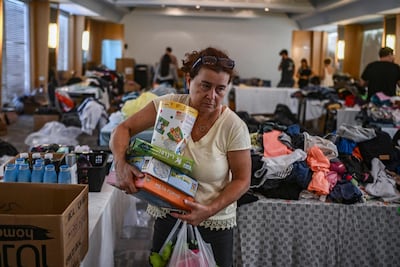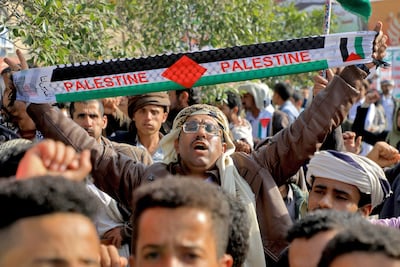Live updates: Follow the latest news on Israel-Gaza
Irit Lahav feels lucky to be living in Eilat, Israel’s southernmost city, despite moving there in the worst circumstances imaginable.
She is a senior member of Kibbutz Nir Oz, one of the communities stormed by Hamas on October 7.
A quarter of its population was lost that day, either killed or taken hostage, Ms Lahav tells The National.
She is grateful her community is getting a chance to regroup in the relative safety of Eilat.
“We needed a lot of peace at the beginning and the fact that we are right next to the beach is so helpful – it lets us sit and process what we’ve been through,” the one-time peace activist says in a busy resort hotel that is accommodating internally displaced Israelis.
“Every one of them was like a family member,” she says of those killed by Hamas.
“During my childhood in the kibbutz, the rule was that the community’s children would sleep communally and not at their parents’ home, so it's like losing many brothers and sisters.”

Tents housing temporary schools, art therapy centres and even free massage parlours have popped up, although evening activities including singing and visits from a clown soon stopped, with Ms Lahav saying people were too traumatised to engage.
Nor has the potential for renewed trauma disappeared.
Like all of Israel, Eilat is still at threat from rockets, although most Hamas projectiles do not have the range to reach the city.
Eilat's residents have two minutes to reach bomb shelters in the event of emergency sirens, the longest amount of time in Israel.
However, rockets and drones, many coming from Yemen, have been intercepted at a steady rate over Eilat’s skies in recent weeks.
Ms Lahav says she is not afraid of the sirens, but some in her community find them extremely traumatic. The most recent sirens sounded on Tuesday.
Last Thursday, Israel made its first ever use of the Arrow 3 air defence system – the most advanced in the country’s arsenal – to intercept a surface-to-surface missile over the Red Sea. It came mere hours after a drone crashed into an Eilat school building.
Just more than a week after the conflict began, US military officials said one of their warships intercepted missiles and drones fired by Houthis from Yemen that could have been intended for targets in Israel.
Yoel Guzansky, a senior researcher at Israel's Institute for National Security Studies, says the dilemma of a more emboldened Houthi adversary is causing some debate in Israel, despite there being little the country can do to counter the threat.
“They have an arsenal of UAVs as well as cruise and ballistic missiles that Iran and Hezbollah have helped supply, but it’s very hard for Israel to respond to a threat that’s 2,000km away,” he says.
“One needs to think rationally about what we can do, how we can do it and when. My answer to all of those questions is that we should wait and simply contain the threat in the interim. I don’t see how a reaction at the moment would do any good.”
Mr Guzansky says that, while the Houthis do not pose a significant danger to Israel at present, they have the means to inflict major damage on the country’s trade routes.
“I think people aren’t speaking enough about the real threat posed by the Houthis to Israel: limiting freedom of navigation,” he says.
“Much of Israel’s trade is sea-bound. Targeting that could cause not just an Israeli response but an Arab and western one, too.”

Yemen expert Helen Lackner predicts that the Houthis will keep up the current tempo of strikes against Israel, because it is giving them “enormous” domestic popularity at a time when public anger in Yemen is otherwise high against the group.
“Anything they send that hits Israel would be little more than symbolic,” Mr Lackner says.
“I don’t think they present in any way a threat to the Israelis. What they are doing is improving their internal circumstances.
“The Palestine cause is extremely popular in Yemen. Support for Palestinians has been there throughout all Yemeni regimes during the past 50 years.”
Despite concerns over the Houthi threat for the new residents of Eilat, it seems for now that Israel has a manageable situation in its south.
However, the challenge of such a hostile adversary on some of Israel’s most important waterways is starting to prompt debates in the country, particularly as it enters the toughest phase of its ground operation in Gaza and potentially catastrophic tensions in the West Bank and on the northern border.


